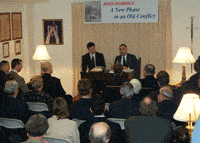
On November 9, over one hundred TFP members, friends and supporters gathered together at the TFP’s Washington Bureau in McLean, Va., to discuss Islam in the post-September 11th world. Speakers at the event included His Imperial and Royal Highness Prince Bertrand of Orleans-Braganza, Joseph D’Agostino, assistant editor of Human Events and head of the TFP Washington Bureau Mario Navarro Da Costa. His Highness Kigeli V, exiled king of Rwanda, attended the discussion as a guest of honor.
Beginning the event, Mr. D’Agostino spoke of the link between radical Islam and the left.
While Islam seems to be hierarchical, is actually an egalitarian religion. The Koran, which clearly teaches inequality between men and women, also teaches that among men there should be little if any distinction.
Because it is also a sensual religion which frowns upon all abstract thought, Mr. D’Agostino demonstrated that radical Islam promotes the Cultural Revolution.
Mr. Da Costa then pointed out that in the 1930s, Prof. Plinio Corrêa de Oliveira predicted Islam’s recent religious resurrection. This predication goes hand in hand with prophesies of saints throughout history such as St. John Bosco.
Centering on history, he showed that militant Islam is a new phase in an age-old war. This is demonstrated by the teachings of Sayyid Qutb, key figure in the formation of Osama Bin Laden.
Quoting these teachings, Mr. Da Costa showed how they are a mixture of Marxism, Islam and self-management, marked by a disdain for logic and a hatred for any vestige of medieval Christendom. Analyzing these teachings, he brought the audience to his conclusion. Far from being an outdated seventh-century ideology, radical Islam is on the cutting edge of a post-modern movement towards self-managing tribalism, the Fourth Revolution. 1
He finished by showing how the United States represents the world’s greatest obstacle to this movement and called upon Americans to stand strong in face of these rising threats.
His Highness Prince Bertrand finished the evening with a message of hope. He showed how, in all epochs God has bestowed sufficient graces on mankind to fulfill His Will. Such will also be the case with the United States in the present conflict.
This conflict, which at root is a religious conflict, he compared to the Crusades. His Highness hoped that, following the example of Europe in the eleventh century, the United States would join together in a collective “Deus vult” 2 and write a new page in history.
